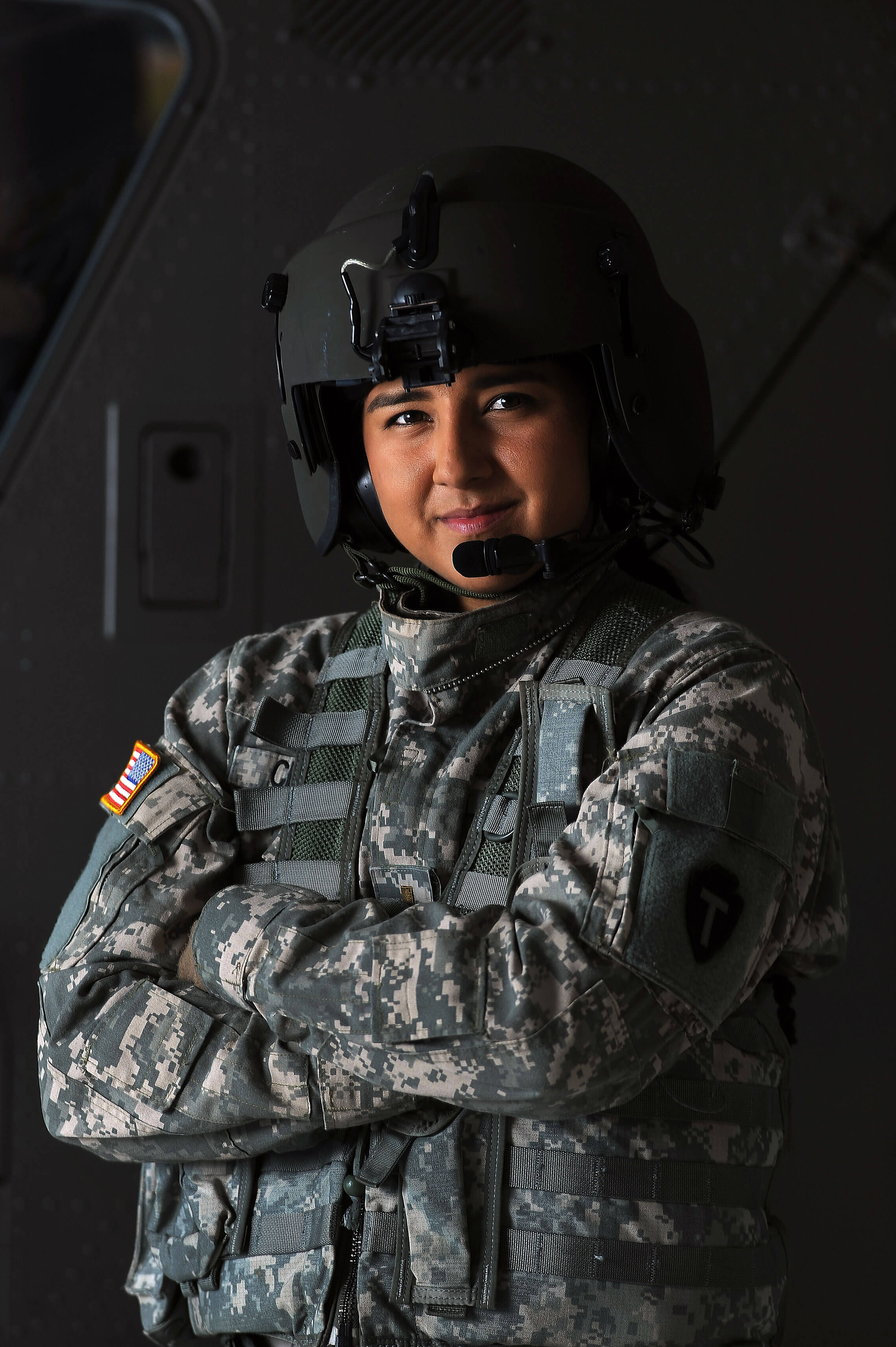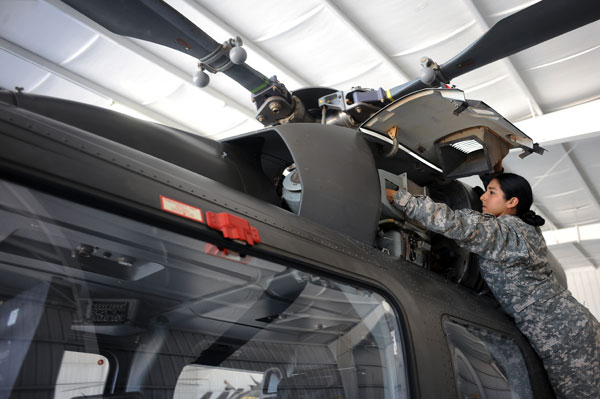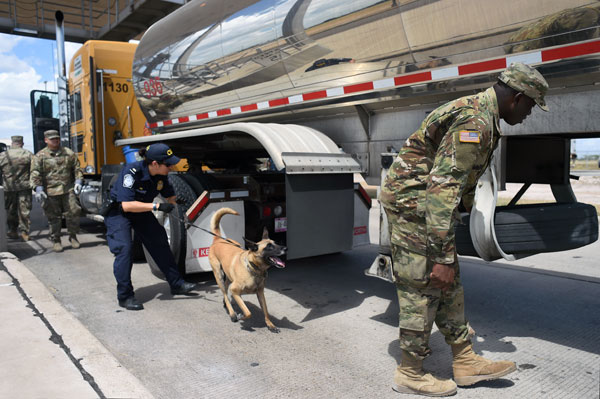|
Army 2nd Lt. Liliana Chavez Uribe, a helicopter pilot with the Texas Army National Guard’s B Company, 1st Battalion, 114th Aviation Regiment, immigrated to the U.S. from Mexico as a child and said she enlisted, in part, to pursue her interest in aviation. That interest was spurred in childhood, when she would watch cropdusters fly low above fields near her family’s home three hours south of the Texas-Mexico border. Her experience is similar to many immigrants currently serving in uniform, both along the border and throughout the military.
|

|
Army 2nd Lt. Liliana Chavez Uribe, a helicopter pilot with the Texas Army National Guard’s B Company, 1st Battalion, 114th Aviation Regiment, stands in the open door of a hangar along the taxiway at McAllen International Airport. Dwarfed by the massive hangar opening, she watches as other Soldiers look over a UH-72 Lakota helicopter, prepping it for a mission later in the day.
The howl of aircraft engines spinning up can be heard in the distance. The noise echoes off the row of hangars, masking the actual source and making it seem as if the sound is omnipresent, coming from everywhere.
The airport, located in McAllen, Texas, is a hub of activity for aviators from the Texas Army Guard flying missions in this part of the state as part of Operation Guardian Support. For Chavez, the flight line, and this area along the border, is familiar territory.
She grew up here. On both sides of the border.
 Chavez performs a pre-flight inspection on a UH-72 Lakota helicopter prior to flying a mission supporting U.S. Customs and Border Protection agents in McAllen, Texas.
Chavez performs a pre-flight inspection on a UH-72 Lakota helicopter prior to flying a mission supporting U.S. Customs and Border Protection agents in McAllen, Texas.
“My father would come over to the United States and work,” she said. “He got us a greencard – my mother, my sister and myself – and eventually we moved here.”
The move happened when she was seven, but Chavez had extended family who lived in Texas as well.
“I did come over a few times to visit my family,” she said, adding that at that age it was the novelty of speaking English, rather than Spanish, that excited her.
“I remember I used to [talk to] my cousins, I was just speaking nonsense, saying ‘?what am saying? What am I saying?’?” she said. “They would say ‘?you’re not saying anything. You’re not making any sense.’”
However, it was back in Mexico, as a kid, when the interest in flying first took hold. Living in a rural area about three hours south of the Texas-Mexico border, Chavez would watch wide-eyed as cropdusters were flown over the fields near her home.
“I have been wanting to fly since the first time I saw an airplane,” she said.
Fast forward to her teenage years in southwest Texas and Chavez joined her high school’s junior ROTC unit. That, in turn, led her to ROTC in college, which led her to the pilot’s seat.
“In ROTC I got the opportunity to go up for the aviation board,” she said. “I put in the packet, took a physical fitness test, went before a whole bunch of important people and was selected.”
Graduating from flight school in December 2017, it wasn’t long after that she came on duty as part of OGS.
“Stepping out of flight school and coming into a mission, an actual mission, and doing something real that’s not training, that’s a big step forward,” Chavez said. “I get to start getting more hours [in the aircraft], more experience, so that way I’m not behind the power curve.”
As an immigrant, Chavez has a shared experience with many others she serves with, both along the border and within the military as a whole.
“Working at the border, I’m just trying to protect the citizens of the United States,” said Spc. Afeez Amusan, with the Texas Army Guard’s Company A, 536th Brigade Support Battalion. “It’s something that is significant to me and is very important.”
Originally from Nigeria, Amusan said he came to the U.S. for greater opportunities, which also led him to enlist.
“I wanted to pay the United States of America back for giving me the opportunity to come to the country,” he said. “If you’re hardworking, and you really want to work, you’re going to make it in this country. That’s one thing I like about this country.”
Amusan said he also likes meeting new people and working along the border has given him the chance to meet a variety of different people.
“My favorite experience is I’ve gotten to meet different people from different areas,” he said.
Army Pfc. Maria Morales, with the Texas Army Guard’s Company A, 172nd Brigade Engineer Battalion, emigrated from Mexico at a young age and had similar thoughts on serving along the border.
 Spc. Afeez Amusan, right, a truck driver with the Texas Army Guard’s Company A, 536th Brigade Support Battalion, inspects a tractor-trailer truck alongside a U.S. Customs and Border Protection agent at CBPs’ Pharr, Texas, port of entry facility. A native of Nigeria, Amusan came to the U.S. to seek greater opportunities and enlisted as a way to “pay the United States of America back for giving me the opportunity to come to the country.”
Spc. Afeez Amusan, right, a truck driver with the Texas Army Guard’s Company A, 536th Brigade Support Battalion, inspects a tractor-trailer truck alongside a U.S. Customs and Border Protection agent at CBPs’ Pharr, Texas, port of entry facility. A native of Nigeria, Amusan came to the U.S. to seek greater opportunities and enlisted as a way to “pay the United States of America back for giving me the opportunity to come to the country.”
“I’m proud of being here,” she said. “It’s not only beneficial for me but for my family too.”
Her own experience of coming to the U.S., Morales said, also gives her a unique perspective on things along the border.
“I know the struggle of coming here,” she said. “I’ve seen people that I know coming and going [across the border].”
Morales stressed that “everybody deserves a chance,” but added that she feels many who cross the border illegally may not be getting the full opportunities often sought.
“I don’t think it’s beneficial for them [to cross illegally] because they come here and they’re [often] just hiding,” she said. “They don’t get the full experience of this country.”
For Chavez, working along the border means she sometimes feels an added focus on her because she immigrated to the U.S.
“I feel like there is sometimes a spotlight on me,” she said, adding that in many ways she’s no different from any other Soldier.
“I’m like anyone else wearing this uniform,” Chavez said. “To me, when you wear this uniform, there’s no difference. It doesn’t matter what color you are, where you come from, what your background is. We all do one mission.”
And like many other Soldiers, Chavez has an internal drive that often pushes her forward. Much of that she attributes to her parents, especially her father.
“My dad, he is really motivating,” Chavez said. “He works in construction, in roofing. He would come back home just burned and blistered every day, non-stop, and he never complained.”
When faced with a challenge, it’s her father she often thinks of to guide her, she said.
“I always stop to sit down and think ‘would this make my dad proud?’” Chavez said, adding that her father taught her and her two sisters to focus and take every opportunity available, even small ones.
“Many opportunities lead me here,” she said. “I took little steps. Little opportunity by little opportunity, I finally got here.”
And being where she is, piloting a UH-60 Black Hawk or a Lakota, is a pretty good place to be.
“I like to feel the lightness of the skids [of the Lakota as it lifts off the ground] and once I’m hovering, my mind just snaps into focus, “Chavez said. “Every time I do fly, it’s like I’m meant to be there.”
And she still feels a similar sense of excitement first experienced as a kid watching cropdusters fly low over green fields.
“Being up in the skies, it’s awesome,” Chavez said. “Once you’re flying, you’re looking left, right, up and down beneath you and you’re surrounded by the airspace. You can go anywhere.”
And for Chavez, going anywhere, means just that.
“The sky is actually not the limit,” she said. “You can be an astronaut if you want to.”
Army 1st Lt. Nadine Wiley De Moura, with the 100th Mobile Public Affairs Detachment, contributed to this story.